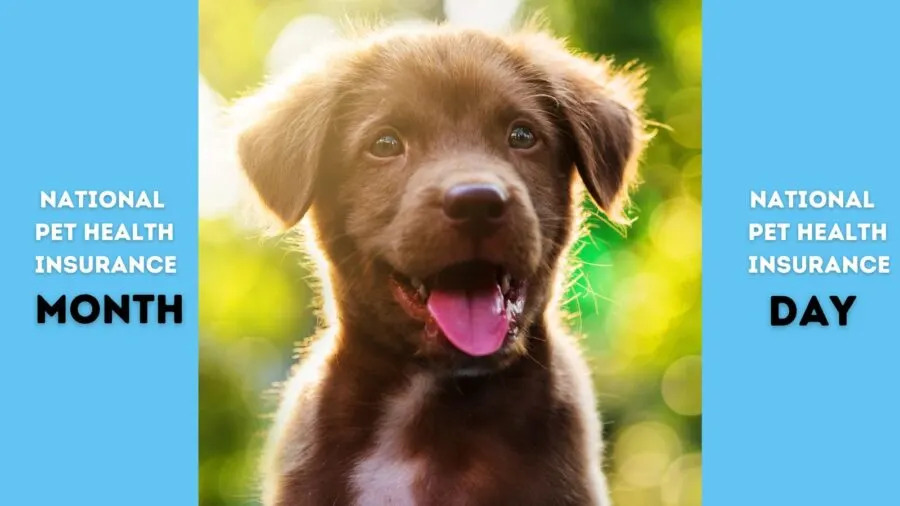Veterinary care is more advanced than ever, extending the lives of many pets with emergency care as well as specialty treatments for heart disease, cancer and other illnesses. That advanced care can come at a price, though, and sadly many pet lovers have had to say goodbye to their pets due to veterinary bills. National Pet Insurance Month and National Pet Health Insurance Day were created to focus attention on the importance of financial preparations to help with those veterinary bills.

When is National Pet Insurance Month? When is National Pet Health Insurance Day?
National Pet Insurance Month is recognized every year in September. National Pet Health Insurance Day is April 7 every year.
Should You Get Pet Insurance?
Like human health insurance, pet insurance helps you pay for treatment in case of accidents or illness. Modern veterinary care has progressed to offer treatments—sometimes expensive ones—for diseases and conditions that previously might have been untreatable.
Personally, we have Trupanion pet insurance for our dogs and our cats. We’ve had some major veterinary bills the last few years, from Irie’s ACL surgery to Tiki’s cancer surgery and chemotherapy treatments, and Trupanion has been great about payments every time.
What to Consider When Shopping for Pet Insurance
Just as when shopping for your own insurance, you’ll find many options when looking for pet insurance—from accident-only coverage all the way to comprehensive coverage that pays for annual visits and vaccines. In between, rates and the amount of coverage varies with sliding scales of deductibles and factors that range from where you live to the age and breed of your dog.
Whether or not to cover your dog through pet insurance is a decision only you can make. Some choose to “self-insure,” putting aside money monthly in a savings account to cover future veterinary bills. Others opt to take out a policy with a high deductible, one that would assist only in a costly illness or accident.
If you are considering pet insurance, here are some considerations:
Compare pet insurance plans.
Like any other insurance policy, pet insurance plans vary widely in everything from exclusions to deductibles. In selecting a pet insurance plan, though, take the time to read the fine print. You’ll want to ask:
- What is the deductible? (Some plans will offer different deductible levels; the higher your deductible, the lower your monthly premium.)
- What percentage of my claim will be reimbursed? Seventy to ninety percent is typical on many policies.
- What is covered? Find out just what the policy covers—before you need coverage for it.
- What’s excluded? Pre-existing conditions are generally excluded from coverage—so don’t wait until you need insurance to try to obtain it. However, some companies also exclude for “hereditary and congenital conditions” so find out exactly what their definition of this is. For example, some policies exclude hip dysplasia. Others offer additional riders for hip dysplasia while some policies cover it unless it was a pre-existing condition.
- Are there breed-specific exclusions that might include my dog? For example, we’ve seen policies that exclude glaucoma in Beagles, Siberian Huskies and Welsh Springer Spaniels and epilepsy in Beagles, Belgian Tervurens, Dachshunds, German shepherds, Golden Retrievers, Keeshonds and Labrador Retrievers.
- Does this plan include ongoing conditions such as epilepsy or diabetes? Some insurance plans have separate riders for ongoing conditions.
- Does this plan cover specialist care such as opthalmologists or dermatologists?
- Will my premiums rise with my dog’s age?
- What’s the discount for multiple pets?
- Does this policy include prescription medications? What about prescription diets?
- What’s the limitation per incident?
- Is there an annual cap on benefits?
- What’s the lifetime limit on benefits?
- Can I use my own veterinarian or do I need to visit a network vet?
- Does this policy cover my dog while he’s traveling with me?
- Does this plan cover a visit to an emergency veterinary clinic?
- Does this plan cover any holistic care? Acupuncture?
Make the decision to insure (or not) early.
If you do decide to insure your dog, shop around first but be sure to insure your pet as soon as possible. Most companies won’t insure a pet with a pre-existing condition.
Also, premiums are lower the younger your dog is—and, at some companies, your premiums will lock in at that lower rate.
Dogs insured younger than one year of age are also eligible for coverage for some conditions such as hip dysplasia that might otherwise be excluded.
Check out accident-only policies.
Another option for pet insurance are accident-only policies. These are lower priced than traditional insurance policies and only cover costly accident care.
Learn about pet insurance discounts.
Does your pet insurance company offer a discount for prepaying for an entire year? Some do and the savings can be as much as 25 percent.
Ask about employee discounts.
Learn if you’re entitled to any special pet insurance discounts through your employer or union. A growing number of companies offer pet insurance as an optional employee benefit to their workers and an increasing number of pet lovers (although still a minority) are opting to cover their dogs with pet insurance.
Look for discounts on pet insurance.
Even if you don’t have a discount through your employer, you may have other memberships that qualify you for a discount.
Ask about pet wellness plans.
Ask your vet clinic if it offers a pet wellness plan. Many corporate veterinary offices (such as VCA and Banfield) offer these plans and a growing number of private veterinary practices—and holistic vets—offer similar wellness plans.
Unlike insurance, these plans are focused on preventative care, offering it at a discount.
More Pet Holidays You Might Like
Pin it to remember

- Review: Jimmy BX7 Pro Anti-Mite Vacuum Cleaner - December 16, 2024
- 🎉 GIVEAWAY: Lord of the Pets Portrait of Your Dog! - November 26, 2024
- Review: Lord of the Pets Portraits - November 17, 2024
